Members of Ethiopian Nobility as Prisoners of War, Italian Invasion of Ethiopia, 1938
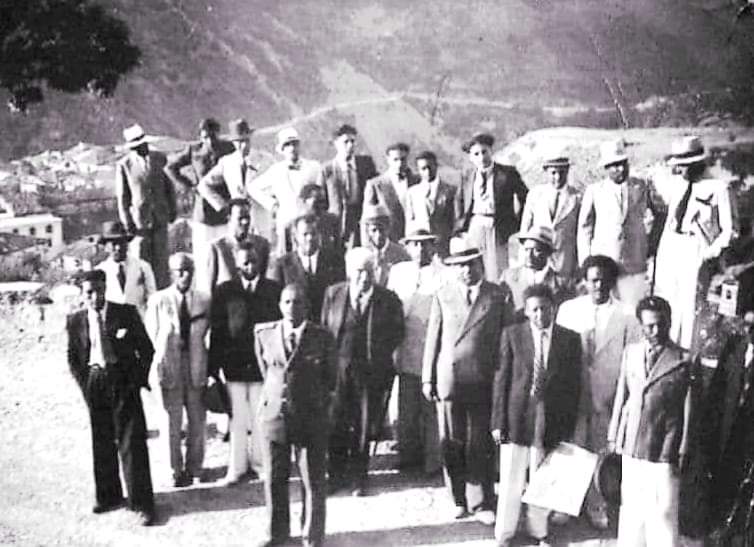 ZeMenelik. CC 4.0 license. Churchill was tolerant of the rise of fascism, and was indifferent to Mussolini's invasion of Ethiopia
ZeMenelik. CC 4.0 license. Churchill was tolerant of the rise of fascism, and was indifferent to Mussolini's invasion of Ethiopia
It has been said that the shadow of WWII hangs over and shapes the world we live in today. It is certainly true that the present can never escape the past. That's one of the reasons I'm constantly looking back as I try to understand the way forward. In this spirit I am reading with great interest Winston Churchill's six-volume opus, The Second World War. As a major player in WWII, Churchill offers an account that may be invaluable, but it is one that certainly has a bias.
I finished reading the first volume, A Gathering Storm, with an idea of how the war came about and who was responsible for the miscalculations that led to it. After a brief conversation with my son (who always has a contrary view), I went back to consult other sources. With these readings, Churchill's spell over me was broken, and I reconsidered my view.
Attack on Carrier USS Franklin, March 1945
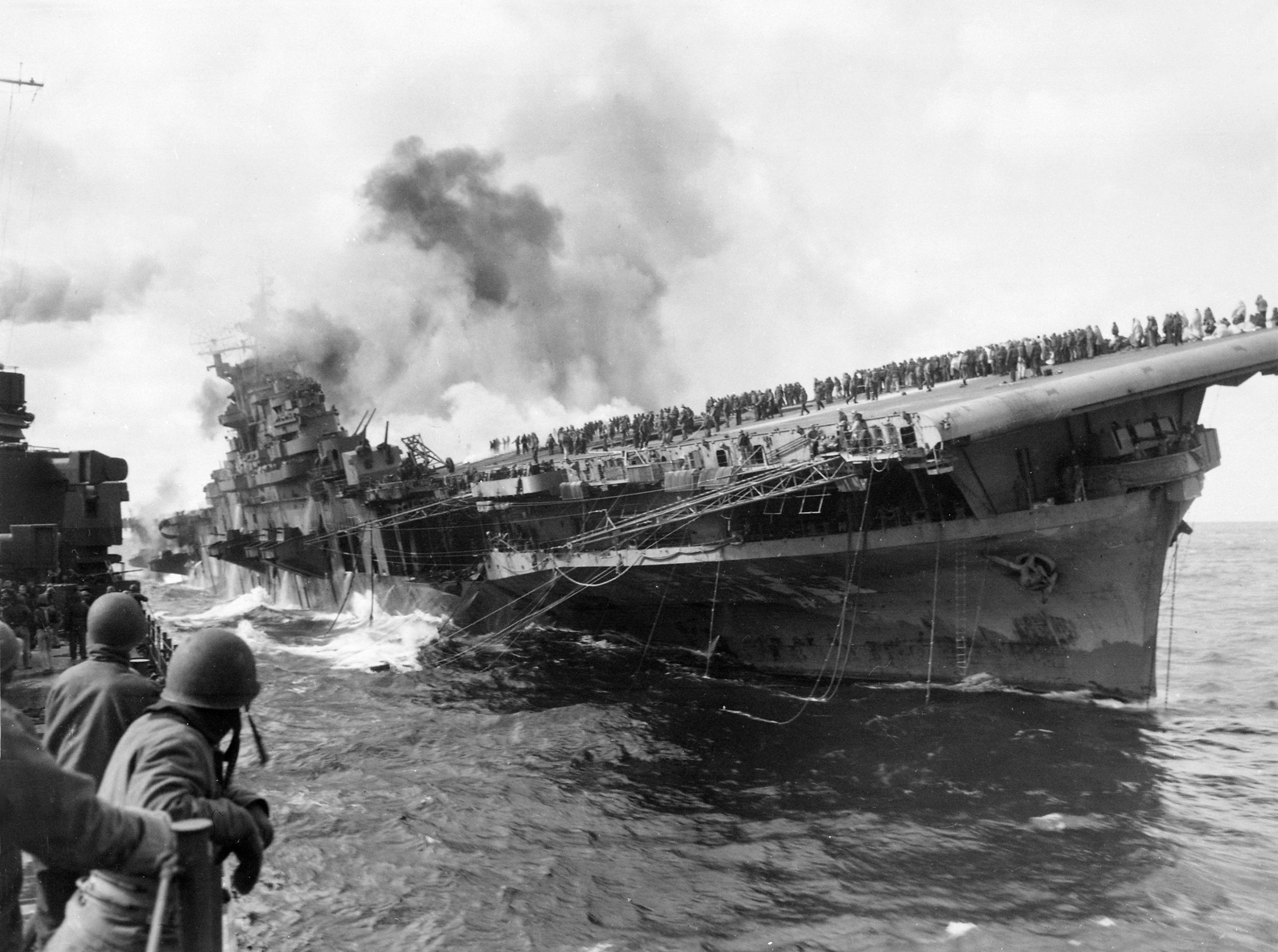 PHC Albert Bullock. Public. My Uncle Al was a prisoner of war on a ship that was sunk near the end of the war. He was rescued but the dead were all around him.
PHC Albert Bullock. Public. My Uncle Al was a prisoner of war on a ship that was sunk near the end of the war. He was rescued but the dead were all around him.
My first disillusionment came with the news that Churchill wasn't the author of the six-volume work, in the sense that we traditionally think of authorship. The volumes were written by a team colloquially called the "Syndicate". Depending on which source I consulted, Churchill almost entirely wrote the book, or the team was essentially the author with Churchill offering guidance and editing. One reviewer minimizes Churchill's role.
the casual reader and scholar alike may well be shocked to know how little of these six volumes Churchill actually wrote himself. Instead, it was a group of authors known as “the Syndicate” who put much of it together. Churchill’s contribution often amounted to little more than laying down a series of documents as the basis for each chapter (“the track”), then filling in the gaps between them with his own dictated memories and long think-pieces by members of his team.
The International Churchill Society describes authorship in a different way:
He would pull together all his documents (or get his researchers to pull them together) – minutes, telegrams, letters – and then would track down material from other sources, too. Churchill would then begin to draft the text which would link all the documents together, dictating to a team of secretaries, often late into the night. Just as he did with all his speeches, he’d check drafts, check proofs, marking them up at each stage with copious corrections, determined to get the right word, the right phrase.
Churchill at Tea Desk in Chartwell, His Private Home
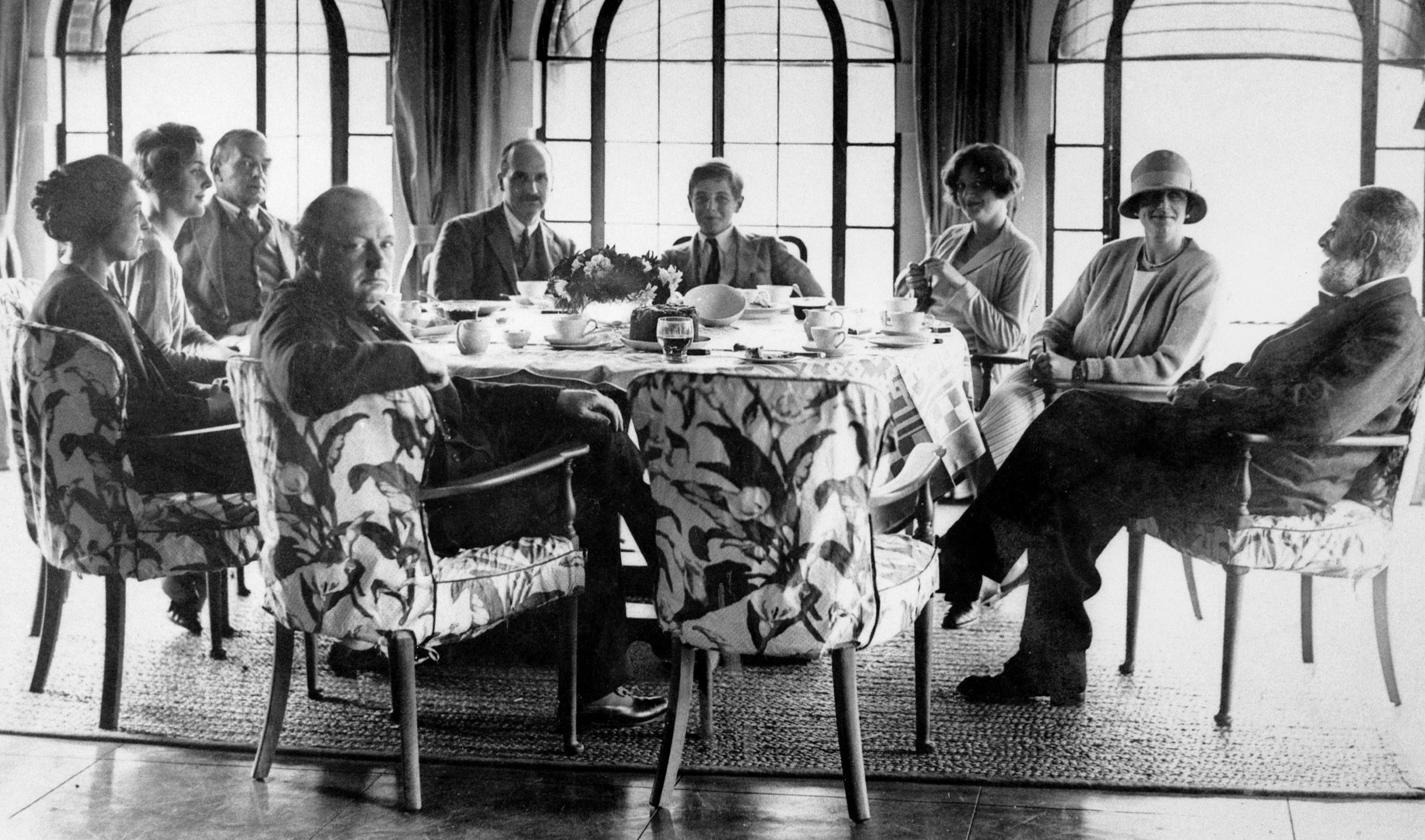 Daily Mail Public domain. He did his writing at Chartwell
Daily Mail Public domain. He did his writing at Chartwell
No doubt, both versions of Churchill's writing process are correct, and may even be saying the same thing. However, taken in isolation, each gives a very different impression of who essentially 'wrote' the massive work. Personally, I see Churchill's hand on every page of this book. It may have been assembled by a team. Long passages may have been contributed by that team. The final product though, the eloquent striking style of the former PM is irrefutable. I've no doubt he put his stamp on every page, and there is not a word he has not reviewed and approved.
When considering the validity of Churchill's perspective on the origins of the war, one has a problem akin to determining the truth of his authorship. This is an account offered from one man's view. What he writes may be true, but what has he chosen to tell and what has he chosen to leave out? These choices inevitably color the story. As a matter of fact, Churchill does not claim that these volumes are history, but he believes they will be invaluable to historians. In his preface he explains that it is not his place to write history, "... for that belongs to another generation. But I claim with confidence that it is a contribution to history which will be of service to the future."
He describes WWII as "...the worst tragedy in (mankind's) tumultuous history."
The City of Wesel, After Allied Carpet Bombing
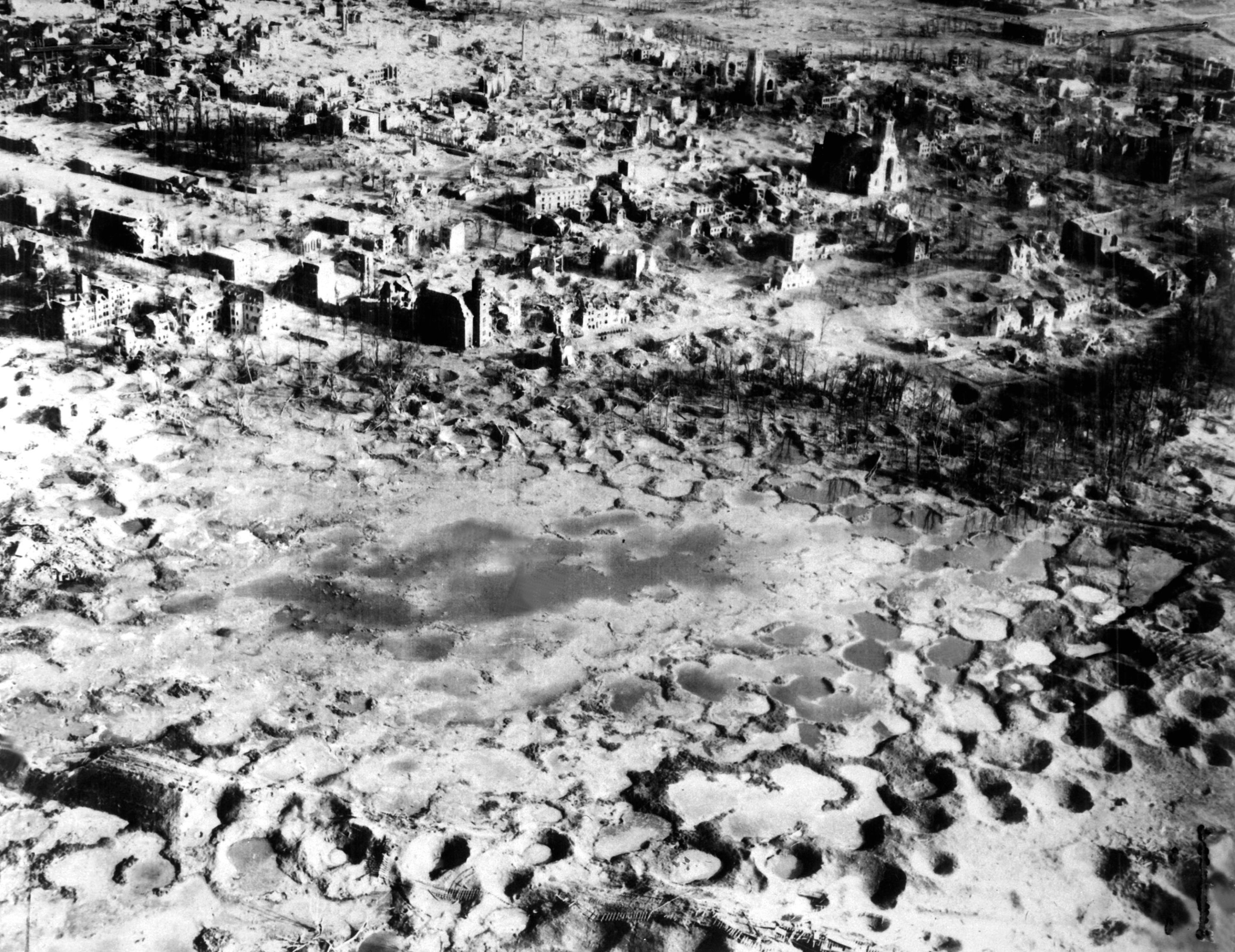 USAFF. Public domain.
USAFF. Public domain.
Determining exactly the dimensions of that tragedy is challenging. It is impossible to come up with accurate numbers that reflect the cost of the war. Some say 70,000,000 souls perished. Some say 50,000,000. Do these figures include all the Chinese who were killed from 1931, when Japan first invaded that nation, through to 1945, when the Japanese were finally driven out? According to one source, 35,000,000 Chinese died as a result of the Japanese aggression. Does the number of casualties include those lost to famine outside of Europe? This number alone is estimated by another source to be between 20,000,000 and 25,000,000. It's jaw dropping to throw around such numbers--there is a lot of space between 20 and 25 million.
In WWII, Churchill asserts, "every bond between man and man was to perish". He further states, "We have at length emerged from a scene of material ruin and moral havoc the like of which had never darkened the imagination of former centuries".
Warsaw Ghetto
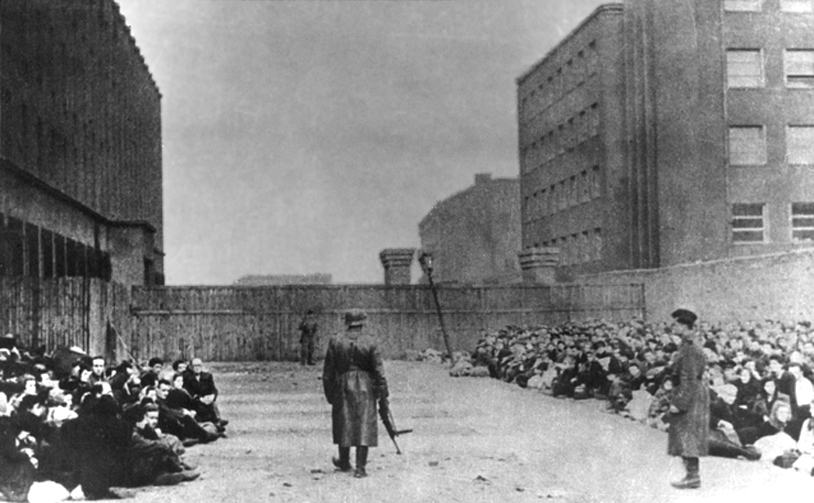 Unknown author. Public Jews Awaiting transportation at the Umschlagplatz, Warsaw Ghetto.1943.
Unknown author. Public Jews Awaiting transportation at the Umschlagplatz, Warsaw Ghetto.1943.
Winston Churchill's first volume, The Gathering Storm attempts to explain how the war came to be and how it could have been prevented. He does so with the hope of avoiding similar miscalculations in the future. He states: "It is my purpose, as one who lived and acted in these days, first to show how easily the tragedy of the Second World War could have been prevented..." He lays blame firmly on those who pursued a middle path: "We shall see how the counsels of prudence and restraint may become the prime agents of mortal danger; how the middle course adopted from desires for safety and a quiet life may be found to lead direct to the bull’s-eye of disaster."
Finally, Churchill advocates for an international organization: "We shall see how absolute is the need of a broad path of international action pursued by many states in common across the years, irrespective of the ebb and flow of national politics." Churchill was one of the driving forces behind the establishment of NATO, and the United Nations. One can see in these two organizations alone the enduring influence of the former British PM on the current world order.
The Unnecessary War Churchill suggested to Franklin Roosevelt that an appropriate name for WWII would be, "The Unnecessary War". He explained, " There never was a war more easy to stop than that which has just wrecked what was left of the world from the previous struggle." I will summarize briefly his major points in support of that thesis.
He starts with the treatment of Germany after WWI. Not only was Germany disarmed and humiliated, but it was hit with such a ridiculous level of debt, through reparations owed to the winners of the war, that it dug its way out in the only way possible. It made its money worthless. In this way, not only was its external debt wiped out, but its internal debt was also wiped out. This helped to create financial chaos in Germany. Churchill points his finger especially at U. S. bankers, who loaned Germany money. They kept loaning Germany money that was repaid in worthless funds, and that kept accumulating debt through interest.
Food Queues, Hanover, Weimar Republic (Germany) 1918
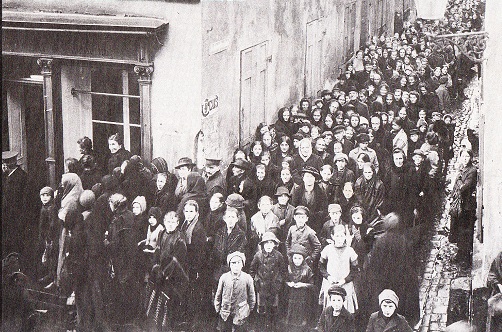 Hanover Press Photographer. PublicHundreds of thousands of people died of starvation in Germany by 1919
Hanover Press Photographer. PublicHundreds of thousands of people died of starvation in Germany by 1919
Another argument he offers: as Germany rearmed, the rest of Europe looked the other way. Germany's rearmament eventually grew so great that its navy was a match for Britain's, and its air force was significantly larger. This air power helped to give Germany dominance over lagging French defenses as bombs rain down from the sky.
The British government's obstinate pacifism. The was a stubborn refusal to see Hitler for what he was, to match his military buildup in the 30s, and to anticipate Hitler's territorial ambitions.
Finally, the Molotov-Ribbentrop treaty, which gave Hitler free rein to attack Western Europe. He did not need to defend his Eastern border from the Soviet Union. Meanwhile, Stalin was fortifying his military and gobbling up land he considered essential to create a sphere of influence for his country.
In sum, WWII came about because of unrealistic pacifists in England, a woefully unprepared France, and Stalin's land grab that gave free rein to German territorial ambitions. Basically, without Stalin's betrayal of his former allies, Germany never could have waged the war that it did. Germany's dramatic and early success was facilitated by Stalin. Failure to deal with Mussolini's aggression allowed Italy to become stronger and a valuable ally with Germany.
The preceding argument is a view of the war, from Churchill's view. Then I started to read other sources, to get other points of view.
I found validation of Churchill's claims to prescience about the danger of a militarized Germany and the reckless naïveté of a woefully unprepared Britain. In Smithsonian Magazine I found the following statements:
- As early as 1930, Churchill, attending a dinner party at the German Embassy in London, had expressed concern about the dangers latent in a rabble-rouser named Adolf Hitler
- In 1934, when the Nazis were in power and were stirring the German populace, Churchill told Parliament “there is not an hour to lose” in preparing to build up British armaments (armaments that he had, a decade earlier, helped reduce).
- Germany, he said, was “arming fast and no one is going to stop her.”
he predicted there could come a time when “the crash of bombs exploding in London and cataracts of masonry and fire and smoke will apprise us of any inadequacy which has been permitted in our aerial defenses.”- In 1935, before Hitler’s plans had become clear, Churchill, in dismay, saw “Germany arming at breakneck speed, England lost in a pacifist dream, France corrupt and torn by dissension, America remote and indifferent.”
Neville Chamberlain Declaring Peace in Our Time, After Munich Peace Pact
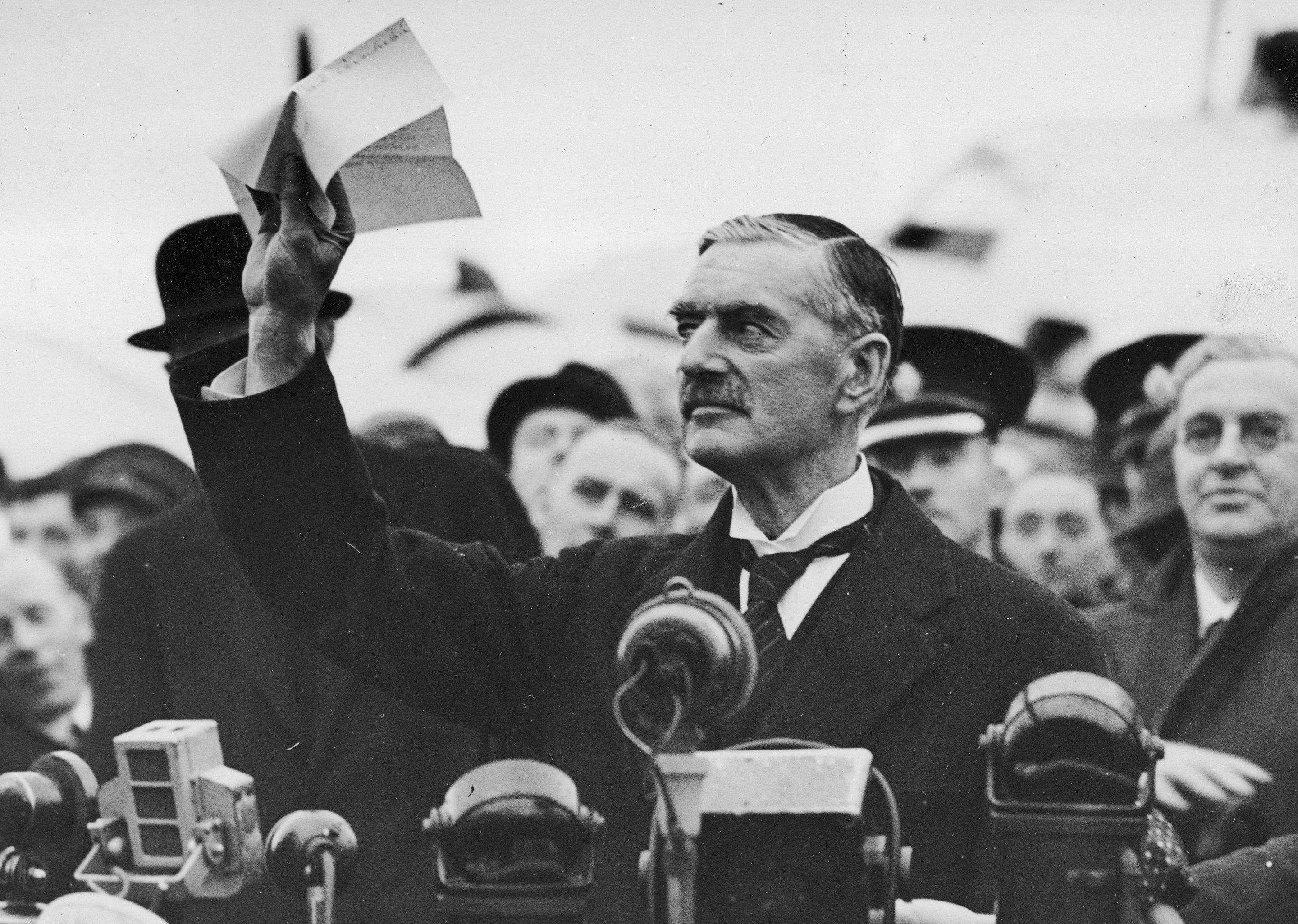 National Archive of Poland. Public. Sept 30, 1938. War was declared less than a year later, Sept 3, 1939
National Archive of Poland. Public. Sept 30, 1938. War was declared less than a year later, Sept 3, 1939
While Churchill was apprehensive about a militarized Germany and a militarily neutered Britain, he was not apprehensive about the growth of fascism in Europe. What he feared more than fascism was communism.
The Russian Revolution (1917-1921) rattled governments and industrialists in Western Europe. Post WWI there was economic disarray which made the philosophy of Marxism attractive to many displaced or impoverished workers. Fascism as an antidote to communism was not only attractive to the propertied classes in Germany, Italy and Spain. It was also attractive to the governments of France and Britain. They feared--even loathed--communism. Both Britain and France did not trust the Soviet Union. Nor did the Soviet Union trust them. The lack of trust between the Soviets and the Western allies prevented the formation of an Anglo-Soviet Treaty. Plus, Hitler had promised Stalin land he very much coveted.
Perhaps if the Western nations had understood the great significance of Soviet participation, there would have been a firm peace treaty and Hitler would not have had a clear Eastern flank. This would have changed the German calculus for success immeasurably.
I'm going to post some resources at the end of this blog, for anyone interested in reading about the conventional version of the war's origins, and some views that challenge this version.
Conclusion To many of my readers WWII is part of distant history. The years and events between that global cataclysm and today may tend to make the war seem irrelevant. I submit that Churchill's words, his analysis of the war's causes, are very much relevant. Churchill was not a perfect man by any means...although he was perfect for the one cause of his life, which was to lead his nation during war. He was Victorian in his worldview. He wanted very much to preserve the British empire, and has been charged with racism. However, he was a brilliant strategist.
British Officials at the Peel Commission, 1936
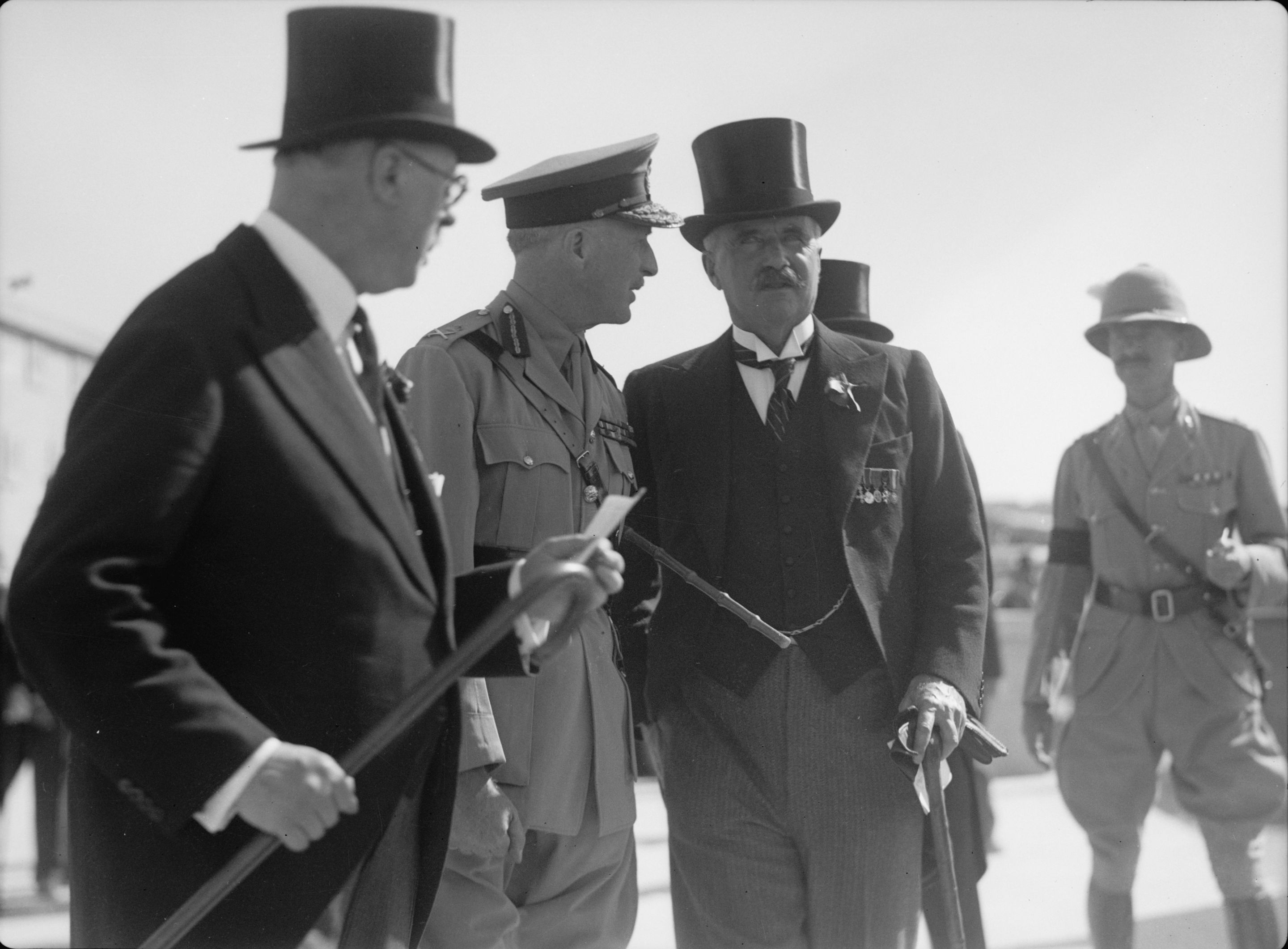 Library of Congress. Public. Churchill made clear his views, quite Victorian, about the inferiority of peoples that were conquered by white Europeans. He stated,"I do not admit that a wrong has been done to these people by the fact that a stronger race, a higher-grade race, a more worldly wise raise...has come in to take their place."
Library of Congress. Public. Churchill made clear his views, quite Victorian, about the inferiority of peoples that were conquered by white Europeans. He stated,"I do not admit that a wrong has been done to these people by the fact that a stronger race, a higher-grade race, a more worldly wise raise...has come in to take their place."
There is so much in this first volume of Churchill's The Second World War I have not touched on. I recommend this PDF for online reading. I have ventured into other volumes, but have not finished all of them. That I will do over time, and not necessarily in order.
Thank you for reading. I know it's long, but the subject is very, very important.
Peace and health to all.
Some Resources
On the political milieu in Europe in the years between WWI and WWII ( I found the starred work particularly informative)
https://www.rbth.com/history/331039-ussr-britain-france-talks-wwii https://www.history.com/articles/molotov-ribbentrop-pact ***https://networks.h-net.org/node/28443/reviews/30113/marks-carley-1939-alliance-never-was-and-coming-world-war-ii https://libcom.org/article/second-world-war-marxist-history https://spartacus-educational.com/spartacus-blogURL118.htm https://www.sar.org.ro/polsci/?p=1256 https://www.thehistoryreader.com/military-history/the-rise-of-the-weimar-republic/ https://www.rbth.com/history/331039-ussr-britain-france-talks-wwii
https://ia802307.us.archive.org/11/items/history-collection/Winston%20Churchill%20-%20The%20Gathering%20Storm%20%28v5.0%29.pdf
Loss of life/displaced persons in the war https://dcas.dmdc.osd.mil/dcas/app/conflictCasualties/ww2 https://www.southwestjournal.com/world/human-cost-of-wwii-a-breakdown-of-military-and-civilian-deaths/ https://newsvoice.se/2025/09/world-war-ii-victory/ https://cepr.org/voxeu/columns/famines-wwii https://en.wikipedia.org/wiki/World_War_II_casualties https://memorie.al/en/there-were-517-albanians-in-the-zemun-nazi-camp-where-132-died-from-epidemics-some-cooperating-with-the-germans-such-as-rare-confession-of-a-former-prisoner/ https://www.nationalww2museum.org/war/articles/last-million-eastern-european-displaced-persons-postwar-germany
Added resources for understanding how WWII came about with Japan https://www.thoughtco.com/the-us-and-japan-before-world-war-ii-3310162 https://ijkh.khistory.org/upload/pdf/7_06.pdf https://www.jaas.gr.jp/jjas/pdf/2016/03_MINOHARA.pdf